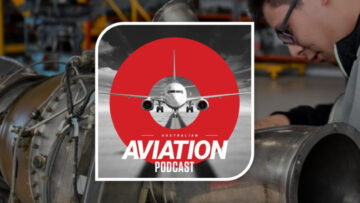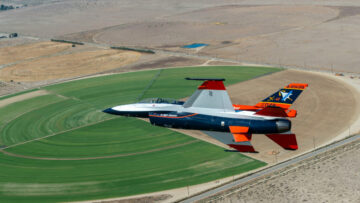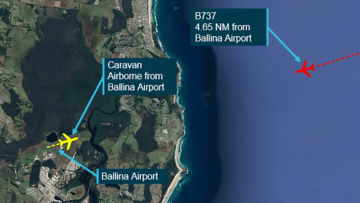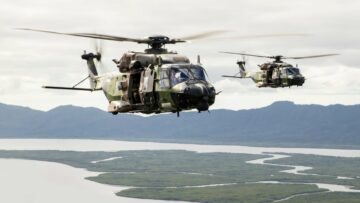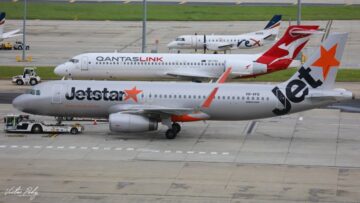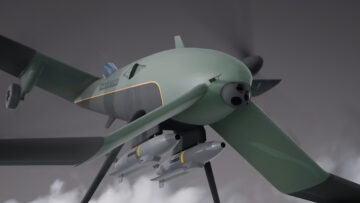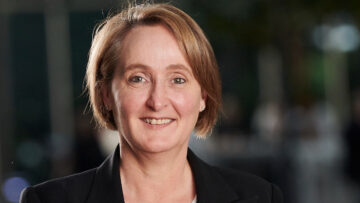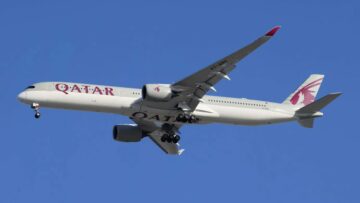
Qantas has again denied accusations of price gouging following the release of a report by former ACCC chairman Allan Fels.
The report, commissioned by the ACTU, stated bluntly that “the duopoly in the aviation sector in Australia is dominated by Qantas and there is price gouging by Qantas”, and called for “unnecessary restrictions on competition” in domestic and international aviation to be removed.
“Qantas fare increases over the three months to December 2022 were large enough to produce a sizable increase in the ‘holiday travel and accommodation’ contribution to inflation, possibly up to 25 per cent of the increase that quarter as it appeared in the ABS CPI measure,” Fels wrote.
“A quarter of the inflation that month was mainly due to Qantas aggressively raising airfares, although Virgin may have also contributed.”
In a statement responding to the report, the Flying Kangaroo said that both it and Jetstar “appreciate the importance of affordable air travel”, and pointed to BITRE data showing a decline in average airfares from their peak in December 2022.
“The temporary spike in fares post-COVID reflected reductions in capacity to improve operational resilience following the challenging restart of the industry once borders opened,” said Qantas.
“These reductions coincided with a period of high demand and the imbalance pushed up fares across all airlines. At the same time, fuel prices increased by more than 60 per cent, driving fares higher again.
“Sale fares are frequently available, with Qantas offering an average of 17 network-wide sales per year and Jetstar offering 10 million fares for less than $100 last year.”
Qantas also addressed the question of competition, saying Australia is “one of the most liberalised aviation markets in the world”.
“Unlike a lot of other jurisdictions, there are no restrictions on foreign carriers setting up domestic operations here,” it said.
“While the domestic market is concentrated, it is still highly competitive. There are now four large jet operators, with Regional Express expanding onto mainline routes and the entry of Bonza.
“Australia has Open Skies Agreements with key markets (including the US, UK, New Zealand and China) and consumers can choose from over 50 airlines that offer international services from Australia.”
The report comes after a Federal Government competition taskforce last month released data suggesting that increasing competition on major routes can dramatically slash airfares.
Dr Andrew Leigh, the Assistant Minister for Competition, pointed to figures from the taskforce showing that airfares average 39.6 cents per kilometre on routes with only one carrier, 28.2 cents on routes with two carriers, and 19.2 cents with three.
“In other words, the price per kilometre is halved when three competitors fly a route compared with the situation when there is only a single monopoly airline. With four or five competitors, the price drops further still,” he said.
The government is undertaking a review of the sector ahead of the release of its Aviation White Paper next year, which will set policy direction towards 2050.
- SEO Powered Content & PR Distribution. Get Amplified Today.
- PlatoData.Network Vertical Generative Ai. Empower Yourself. Access Here.
- PlatoAiStream. Web3 Intelligence. Knowledge Amplified. Access Here.
- PlatoESG. Carbon, CleanTech, Energy, Environment, Solar, Waste Management. Access Here.
- PlatoHealth. Biotech and Clinical Trials Intelligence. Access Here.
- Source: https://australianaviation.com.au/2024/02/qantas-denies-price-gouging-after-ex-accc-chairs-report/
- :has
- :is
- $UP
- 17
- 19
- 2%
- 2022
- 2050
- 25
- 28
- 39
- 50
- 6
- a
- ABS
- Accusations
- across
- addressed
- affordable
- After
- again
- aggressively
- agreements
- ahead
- AIR
- airline
- Airlines
- All
- also
- Although
- an
- and
- Andrew
- appeared
- ARE
- AS
- Assistant
- Australia
- available
- average
- aviation
- BE
- borders
- both
- by
- called
- CAN
- Capacity
- carriers
- cent
- cents
- chairman
- challenging
- China
- Choose
- coincided
- COM
- comes
- compared
- competition
- competitive
- competitors
- Concentrated
- Consumers
- contributed
- contribution
- CPI
- data
- December
- Decline
- Demand
- denied
- direction
- Domestic
- dominated
- dramatically
- driving
- Drops
- due
- enough
- entry
- expanding
- express
- Federal
- Federal government
- Figures
- five
- flying
- following
- For
- foreign
- Former
- four
- frequently
- from
- Fuel
- further
- Government
- halved
- Have
- he
- here
- High
- higher
- highly
- HTTPS
- imbalance
- importance
- improve
- in
- Including
- Increase
- increased
- Increases
- increasing
- industry
- inflation
- International
- IT
- ITS
- jpg
- jurisdictions
- Key
- large
- Last
- Last Year
- less
- Lot
- mainly
- major
- Market
- Markets
- May..
- measure
- million
- minister
- Month
- months
- more
- most
- New
- New Zealand
- next
- no
- now
- of
- offer
- offering
- on
- once
- ONE
- only
- onto
- open
- opened
- operational
- operational resilience
- Operations
- operators
- or
- Other
- over
- Paper
- Peak
- per
- period
- plato
- Plato Data Intelligence
- PlatoData
- policy
- possibly
- price
- price gouging
- Prices
- produce
- pushed
- Quarter
- question
- raising
- reductions
- reflected
- regional
- release
- Removed
- report
- resilience
- responding
- restrictions
- review
- Route
- routes
- Said
- sales
- same
- saying
- sector
- Services
- set
- setting
- showing
- single
- situation
- sizable
- skies
- spike
- stated
- Statement
- Still
- taskforce
- temporary
- than
- that
- The
- their
- There.
- three
- time
- to
- towards
- travel
- two
- Uk
- us
- Virgin
- was
- were
- when
- which
- white
- white paper
- will
- with
- words
- wrote
- year
- Zealand
- zephyrnet

